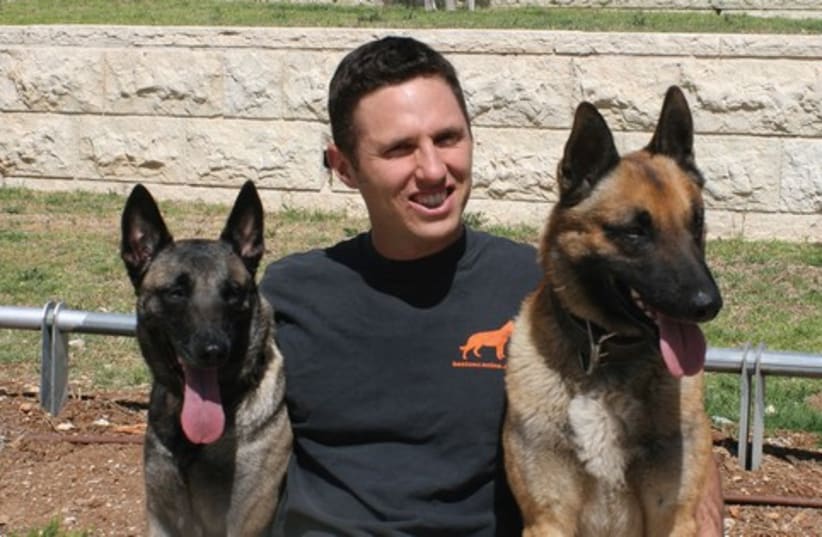From Boston to Jerusalem, 2006
Dog owners in Jerusalem and Tel Aviv who are struggling to understand why their pet isn’t complying with their wishes can rest assured. The solution may have arrived with a teudat oleh in hand. Dog trainer David Sidman has two very obedient canines.BEFORE ALIYA Sidman grew up in a suburb of Boston, Massachusetts. Although his father was an ardent Zionist, Sidman did not attend Hebrew school. After his dad’s sudden death, when David was eight years old, his curiosity about the Arab-Israeli conflict catalyzed his journey into learning the story of Israeli history.After high school, he decided to hold off on college and volunteer on a kibbutz. “It was a pretty short-lived experience. The socialist mindset of the kibbutzim came as a bit of a shock to my system. Although I didn’t realize it at the time, I came to Israel primarily for spiritual nourishment. The secular kibbutz experience simply didn’t live up to my expectations.“One day when I was visiting the Kotel, a ‘scout’ from a yeshiva found me and convinced me to sit in on a class. That class turned into an academic year.”Sidman volunteered for the IDF in March 2000. He was selected for an elite unit of combat dog handlers. “It was really a no-brainer. I’ve always had a love of dogs. After my bar mitzva, I begged my mother to let me adopt a dog from the pound. She eventually succumbed. Every morning, before my fellow classmates even woke up, I was walking and training my new best friend, Gizmo, in the bitter Boston winter. The army served as an opportunity for me to take my dog training to the next level.”After his discharge, Sidman went back to the US. Working independently as a dog trainer in Boston, training with police dogs and running two dog obedience schools simultaneously, his financial success wasn’t enough to keep him in the Diaspora.“Although I was doing quite well for myself financially, my soul was hungry and I had no reservations about giving it all up to return to the homeland of the Jewish people.”
ON ARRIVALSidman arrived in 2006 and lived in Gedera with a friend from the army. “Although my sister lived here as well, her apartment couldn’t accommodate the two dogs I brought with me. I spent the first few months looking for a place of my own and to reestablish my dog training business.”FAMILYIn 2009, Sidman married Israeli-born Avigal. “I’m positive that she was God’s gift for returning to Israel.” he says.Sidman’s mother and stepfather reside in Boston. His younger brother is a sophomore at the University of Michigan. His older sister who made aliya lives with her husband and four children in Yad Binyamin.“I miss my family in the US but definitely not to the point where I would consider leaving this incredible country. Plus my in-laws are pretty great to me.”
LANGUAGESidman’s wife, of course, is fluent in Hebrew. He is as well, but with a heavy American accent. “It’s kind of a catch-22. On the one hand, my wife gives me a hard time about my accent, so I try to mimic how Israelis speak. But when I do that, I apparently sound really angry,” he says.WORK Sidman is working as a dog trainer. He travels to clients from Jerusalem to the Tel Aviv area on a weekly basis, making house calls. His wife works as an interior designer.“I do okay for myself financially, but nowhere near as good as in Boston. But if he who is rich is happy with his share, then I am a millionaire.”SOCIAL LIFESidman has joined a football team in the Israeli Football League. He played football in high school and saw the amateur league as a great way to play his favorite sport, stay in shape and make friends. He also hosts the IFL show on Israel Sports Radio.When not on the football field, he can be found in the gym. He also dabbles in stand-up comedy but mostly enjoys watching TV with his wife. “She likes Project Runway. I like The Dog Whisperer.”ACCOMMODATIONThe Sidmans hope they can stay in the Jerusalem area. “Our lives are here,” he says. However, he admits that he romanticizes about moving to the North and having a solid client base in the Center.REFLECTIONS Sidman has no regrets. “People say that Israel is a difficult place to make a living. This may be true coming from America, but one must put it into perspective. If you came from Ethiopia, I’m sure you wouldn’t be saying that.”His advice is to make a lot of friends. “You can have a much easier time getting by in this country when you know the right people. The more friends you have, the more right people you will know.”Although people here are more frugal, Sidman doesn’t always see this as a wise philosophy.“In my business of dog training, for example, I had a client whose dog wasn’t house broken. She called me to set up an appointment but didn’t want to pay the NIS 275. A few months later she called me again. The accidents got worse to the point where her dog ruined a NIS 2,000 rug that she was forced to throw out. If only she realized that for a fraction of the value of her rug, that disaster could have been prevented. I have endless stories like this.”Sidman encourages all dog owners to make aliya. “Israel is a great country for dogs. The selection of dog foods, quality of veterinarians, breeders and trainers is just as good as, if not better than, the US.”He has one final piece of advice about dogs: “If you don’t train them, don’t blame them.”
